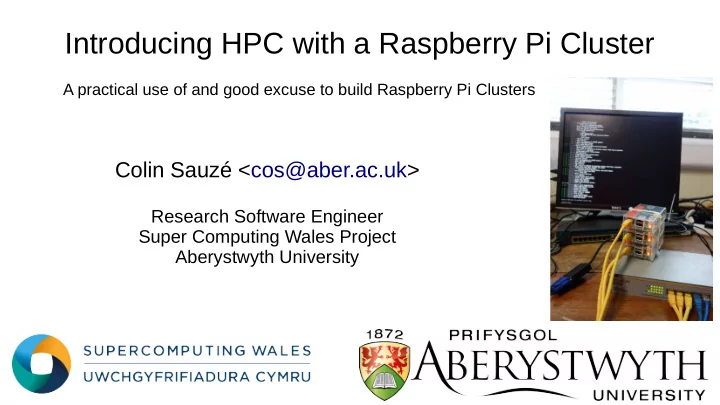

Introducing HPC with a Raspberry Pi Cluster A practical use of and good excuse to build Raspberry Pi Clusters Colin Sauzé <cos@aber.ac.uk> Research Software Engineer Super Computing Wales Project Aberystwyth University
Overview ● About Me ● Inspirations ● Why teach HPC with Raspberry Pi? ● My Raspberry Pi cluster ● Experiences from teaching ● Future Work
About Me ● Research Software Engineer with Supercomputing Wales project – 4 university partnership to supply HPC systems – Two physical HPCs ● PhD in Robotics – Experience with Linux on single board computers – Lots of Raspberry Pi projects
Inspiration #1: Los Alamos National Laboratory ● 750 node cluster ● Test system for software development ● Avoid tying up the real cluster
Inspiration #2: Wee Archie/Archlet ● EPCC’s Raspberry Pi Cluster ● Archie: 18x Raspberry Pi 2’s (4 cores each) ● Archlet: smaller 4 or 5 node clusters. ● Used for outreach demos. ● Setup instructions: https://github.com/EPCCed/w ee_archlet Image from https://raw.githubusercontent.com/EPCCed/wee_archlet/master/images/IMG_20170210_132818620.jpg
Inspiration #3: Swansea’s Raspberry Pi Cluster ● 16x Raspberry Pi 3s ● CFD demo using a Kinect sensor ● Demoed at the Swansea Festival of Science 2018
Why Teach with a Raspberry Pi cluster? ● Avoid loading real clusters doing actual research – Less fear from learners that they might break something ● Resource limits more apparent ● More control over the environment ● Hardware less abstract ● No need to have accounts on a real HPC
My Cluster ● “Tweety Pi” – 10x Raspberry Pi model B version 1s – 1x Raspberry Pi 3 as head/login node – Raspbian Stretch ● Head node acts as WiFi access point – Internet via phone or laptop
Demo Software ● British Science Week 2019 Simple Pi with Monte Carlo methods demo – MPI based – GUI to control how many jobs launch and show – queuing ● Swansea CFD demo Needs more compute power – 16x Raspberry Pi 3 vs 10x Raspberry Pi 1 – ● Wee Archie/Archlet Demos Many demos available – I only found this recently ● https://github.com/EPCCed/wee_archie –
Making a realistic HPC environment ● MPICH ● Slurm ● Quotas on home directories ● NFS mounted home directories ● Software modules ● Network booting compute nodes
Network booting hack ● No PXE boot support on original Raspberry Pi (or Raspberry Pi B+ and 2) ● Kernel + bootloader on SD card ● Root filesystem on NFS Cmdline.txt contains: – console=tty1 root=/dev/nfs ● nfsroot=10.0.0.10:/nfs/node_rootfs,vers=3 ro ip=dhcp elevator=deadline rootwait ● SD cards can be identical, small 50mb image, easy to replace
Teaching Materials ● Based on Introduction to HPC with Super Computing Wales carpentry style lesson: What is an HPC? – Logging in – Filesystems and transferring data – Submitting/monitoring jobs with Slurm – Profiling – Parallelising code, Amdahl’s law – MPI – HPC Best Practice –
Experiences from Teaching – STFC Summer School ● New PhD students in solar physics – Not registered at universities yet, no academic accounts ● 15 people each time – 1st time using HPC for many – Most had some Unix experience ● Subset of Super Computing Wales introduction to HPC carpentry lesson
Feedback ● Very Positive ● A lot seemed to enjoy playing around with SSH/SCP First time using a remote shell for some – Others more adventurous than they might have been on a real HPC – ● Main complaint was lack of time (only 1.5 hours) Only got as far as covering basic job submission – Quick theoretical run through of MPI and Amdahl’s law – Probably have 3-4 hours of material – ● Queuing became very apparent 10 nodes, 15 users – “watch squeue” running on screen during practical parts –
Problems ● Slurm issues on day 1 – Accidentally overwrote a system user when creating accounts ● WiFi via Laptop/phone slow – When users connect to the cluster its their internet connection too – Relied on this for access to course notes
Experiences from teaching – Supercomputing Wales Training ● Approximately 10 people – Mix of staff and research students – Mixed experience levels – All intending to use a real HPC ● Simultaneously used Raspberry Pi and real HPC – Same commands run on both ● Useful backup system for those with locked accounts ● Feedback good – Helped make HPC more tangible
Future Work ● Configuration management tool (Ansible/Chef/Puppet/Salt etc) instead of script for configuration ● CentOS/Open HPC stack instead of Raspbian ● Public engagement demo which focuses on our research – Analysing satellite imagery – Simulate the monsters from MonsterLab (https://monster-lab.org/)
More Information ● Setup instructions and scripts - https://github.com/colinsauze/pi_cluster ● Teaching material - https://github.com/SCW-Aberystwyth/Introduction-to-HPC-with- RaspberryPi ● Email me: cos@aber.ac.uk
Recommend
More recommend